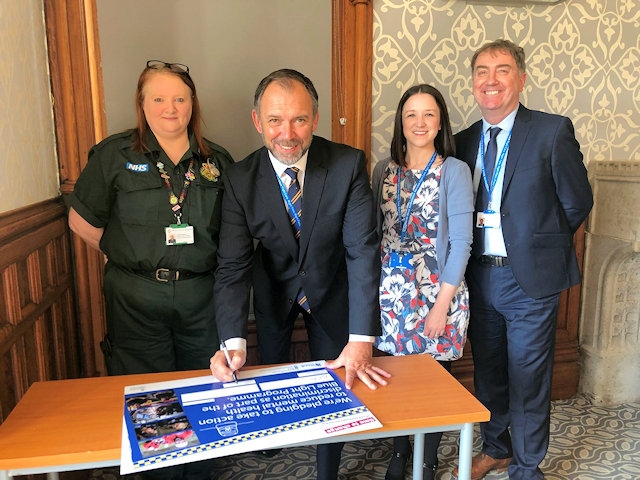NWAS increases mental health support for staff
Date published: 26 March 2019

Amanda Ferguson, Blue Light Champion Co-ordinator; Peter White, Chairman; Laura Smoult, HR Project Manager and Michael Forrest, Interim Chief Executive sign the Blue Light Pledge to take action to reduce mental health discrimination
After a four-year long collaboration with mental health charity, Mind, the North West Ambulance Service (NWAS) has made a positive impact on mental health support for its emergency services staff with 85 per cent of staff saying the trust takes positive action on health and well-being, an eleven per cent increase in three years.
Since signing the ‘Blue Light - Time to Change’ pledge in 2016, committing to taking action on mental health, the trust has worked on a number of initiatives including growing the number of ‘blue light champions’ from four to almost 100 across the organisation.
These champions are members of staff from all areas of the trust who offer one to one support for any mental health concerns staff may have, whether that be due to attending a particularly traumatic incident, or an issue which may be happening at home.
Mind has been providing a dedicated ‘Blue Light Programme’ of mental health support to 999 staff and volunteers across police, fire, ambulance and search and rescue service since 2015. Data from the mental health charity reveals that in just a few years, the Government-funded programme has had a positive impact when it comes to attitudes and awareness surrounding mental health across the four blue light services.
Four years on from the launch of the programme, NWAS has reflected on the progress made and is now looking to future aspirations. A revised action plan has been completed entitled ‘Blue Light - Time to Change’ in order to allow the trust to re-pledge its commitment.
Research from Mind reveals that emergency services staff and volunteers are over twice as likely to say that their service encouraged them to talk about their mental health, compared to four years ago. The survey, conducted to coincide with the release of a report marking the end of Mind’s Blue Light Programme, showed that almost two in three emergency services personnel (64 per cent) said they felt encouraged to talk about their own mental health, compared to just under one in three (29 per cent) in 2015.
Interim Chief Executive, Michael Forrest, said: “I’m delighted with how much the trust has really moved forward in the past four years in terms of support for our staff and I would like to thank Mind for the work that they have done to help to change views on mental health within emergency services and improve support.
“It’s important that we’re playing a part in not only trying to reduce the stigma associated with mental health, but ensuring there is vital support available to all our staff. We have a responsibility to ensure this support continues going forward and I would like to thank all the staff involved for their hard work and dedication.”
Other ways in which NWAS are proactive in raising awareness on mental health and reducing the stigma of talking about it include making sure local managers are equipped to take responsibility and accountability for their staff’s mental health and overall wellbeing.
This is done by having conversations, encouraging take up of health and wellbeing initiatives, providing information about mental health support and signposting to other support available.
The trust also has an in-house ‘Invest in Yourself’ microsite, which has been created for staff to share their own stories, get tips and ideas to help them be happy, healthy and fit, plus much more.
Anna Parry, Head of Strategy and Programmes at the Association of Ambulance Chief Executives (AACE) says: "In an environment where demand for ambulance services is unrelenting, ambulance staff can sometimes be so focused on looking after others that their own mental health and wellbeing suffers significantly.
"Like other blue light services we have seen increases in staff reporting poor mental health, high levels of work stress and greater ill-health. It is of such concern that the wellbeing of our workforce is now one of the top priorities for all ambulance services and there are a number of key strategies in place to address this huge issue - at local and national levels.
"The Mind Blue Light Programme - of which AACE has been a committed supporter - has played a vital role in highlighting the impact that poor mental health is having on 999 staff. It has helped enable many ambulance staff to speak to mental health professionals in a safe and supportive environment whilst also offering training and advice.
"We expect all of our member organisations to continue to take forward the positive progress made by the excellent Mind Blue Light Programme and we will support this process centrally, as the key representative body for ambulance services.”
Do you have a story for us?
Let us know by emailing news@rochdaleonline.co.uk
All contact will be treated in confidence.
Most Viewed News Stories
- 1Police seize £48,000 in Rochdale property search
- 2The plan for two new apartment blocks with an unusual car parking system
- 3Andy Burnham responds to harrowing reports from hospital nurses
- 4The museum undergoing £8.5m transformation now needs a new roof
- 5£1.31 million boost for Rochdale families through Start for Life initiative
To contact the Rochdale Online news desk, email news@rochdaleonline.co.uk or visit our news submission page.
To get the latest news on your desktop or mobile, follow Rochdale Online on Twitter and Facebook.

